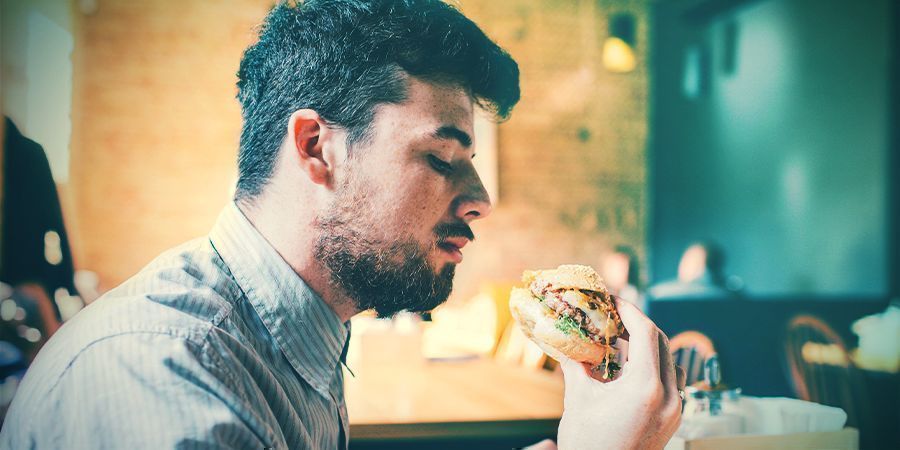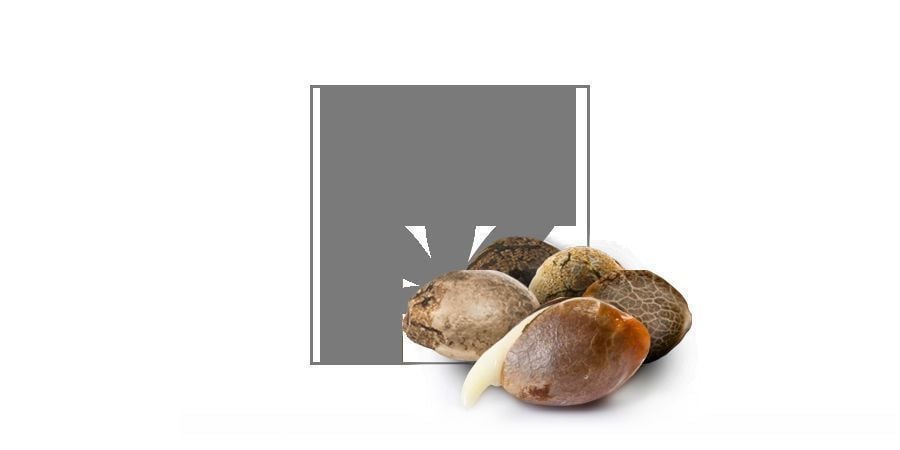
What Causes Marijuana Paranoia And How To Overcome It
Weed paranoia is unpleasant, and is a common reason for quitting weed. That being said, knowledge is power; if you know what weed paranoia is, what causes it, and how to prevent it, there's no need to let it come between you and your high. Furthermore, if you do find yourself experiencing weed paranoia, there are ways to combat it.
We all have a story of weed paranoia. A friend who becomes suddenly suspicious of us. A post-toke moment where the world suddenly seems immense, terrifying, and unknown. A sneaking suspicion triggered by the weed, which we later realise was embarrassingly irrational. Some people have such terrifying experiences of paranoia that they stop smoking weed altogether. Weed paranoia also seems to be self-reinforcing—people who get paranoid during one sesh will often find themselves falling more easily into paranoia in future ones.
Fortunately, strategies exist for curbing this unsettling side effect. But before we can know how to treat weed paranoia, we need to understand it.
WHAT IS WEED PARANOIA?

Paranoia is the irrational belief that you’re being persecuted, or that others are conspiring against you. A paranoid person might interpret innocent comments or random coincidences as deeply meaningful or full of sinister intent. Paranoia combines feelings of being targeted with feelings of being specially singled out; it’s a dark reflection of a Messiah Complex.
Weed paranoia is what happens when this state is sparked by cannabis use. Weed paranoia only lasts as long as the high and does no permanent damage, but is very unpleasant. Those states produce mistrust, an inability to relax, and feelings of terror or fear; it’s a surefire recipe for a bad trip.
For some smokers, weed paranoia is an ongoing issue, while for others it’s unheard of. What makes some users prone to this unpleasant condition and not others?
WHAT CAUSES WEED PARANOIA?

Not everyone experiences weed paranoia. A study by Freeman et al. suggests that some users are especially susceptible. Weed paranoia tends to be sparked by negative affect (aka bad emotions) and anomalous experiences (aka hallucinations). People who experience these side effects are most at risk of weed paranoia. In other words, if you smoke weed and start feeling scared or hear the trees whispering your name, you should remain vigilant for a paranoid episode.
People who are temperamentally neurotic, prone to suspicion, or who have reason to be mistrustful are also more likely to experience weed paranoia. To offset the latter, smoke weed with people you trust.
Timothy Leary famously said that the effects of a trip are determined by set (the mindset of the individual), setting (the environment in which they do the substance), and drug (qualities of the substance itself). We’ve covered set and setting, but what about "drug"?
STRAIN CHOICE CAN INFLUENCE PARANOIA
There’s something fishy about weed paranoia. How can weed have both medicinal benefits for treating anxiety, and also induce this anxiety-provoking condition?
The division between strains that increase anxiety and those that decrease it depends on their cannabinoids and terpenes. High-THC strains are known to increase anxiety and to contribute to weed paranoia. The above study confirms this; subjects were given either THC or a placebo, and then put through a series of potentially paranoia-inducing VR and social tasks. Those in the THC treatment were significantly more likely to experience paranoia compared to the control group.
In contrast, CBD tends to decrease symptoms of anxiety and paranoia. This could have to do with a few things going on in the brain. CBD seems to indirectly reduce activation of CB1 and CB2 receptors, while THC activates these receptors. It’s possible that over-activation of these receptors is in some way associated with weed paranoia, particularly in the emotionally active amygdala. CBD also activates the 5-HT1A serotonin pathway, which is known to decrease anxiety.
Terpenes, elements of the cannabis plant famous for giving weed its flavour, may also influence the likelihood of weed paranoia. Smokers looking to avoid paranoia would do well to find a strain high in beta-caryophyllene and other relaxing terpenes. Good options include Dinamed CBD, which measures 14% in CBD with only trace amounts of THC. For those who might want a hint of THC with their CBD, CBD Therapy offers a 1:20 THC to CBD ratio, where all that CBD will very likely knock out any possibility of paranoia. Other high-CBD, low-THC strains include CBD Fix and Swiss Dream.
Cannabis users with a history of weed paranoia don’t need to go cold turkey; rather, they’d be wise to pick a CBD-rich strain with lower THC levels and a good blend of relaxing terpenes, like the ones listed above. In the following section, we’ll discuss tips one can use for dealing with weed paranoia once they’re already in the grips of it.
HOW TO DEAL WITH WEED PARANOIA

The above tips are all well and good if you’re at the stage of buying your perfectly calibrated strain of choice, or the corresponding seeds, but what do you do if you’re already in the grips of weed paranoia? Here are some tips for weathering the storm.
-
Go Somewhere Safe: You don’t want to be undergoing weed paranoia at a nightclub. Do whatever it takes to get yourself in an environment free of physical, social, or emotional danger. Take a cab home if necessary.
-
Talk Through The Paranoia With A Trusted Friend: Paranoia is rarely rational. Talking through it can help uncover holes in the paranoid narrative through which reality can flow back in. If your paranoia is so intense that you trust no one, writing it out can also help.
-
Relax: Play chill music, close your eyes, mellow out. Try some meditation if that’s your jam.
-
Drink Pepper Lemonade: Lemon and pepper both contain terpenes that can diminish the psychoactive effects of THC. Squeeze some lemons in a glass, add in lemon zest and fresh ground pepper, and then fill the glass up with ice and club soda or just water. Then get into bed and sip your paranoia away.
-
Take Some CBD: Now is the time to break out the CBD oil. This should mitigate the anxiety-inducing effects of the THC. Smoking one of the above high-CBD strains is also an option.
-
Eat A Meal: Get grounded with some hearty food. Something full of good fats and nutrients should help sober you up and get you in touch with reality.
-
Take A Walk: Or a jog! Nothing like getting your body moving to help burn through some of that excess THC.
-
Take A Shower: Bonus points: Turn the tap to “cold” for the final 30 seconds to give your brain a good blast of clear energy. There are few experiences more sobering than this!
FINAL WORD ON POT-INDUCED PARANOIA
Weed paranoia is unpleasant, but it’s not the end of the world. If you’re prone to it, invest in a CBD-heavy strain and memorise the above tips in case you ever need them. There’s no need to let paranoia ruin your relationship with weed!
- Freeman D, Dunn G, Murray RM, Evans N, Lister R, Antley A, Slater M, Godlewska B, Cornish R, Williams J, Di Simplicio M, Igoumenou A, Brenneisen R, Tunbridge EM, Harrison PJ, Harmer CJ, Cowen P, & Morrison PD. (2015 Mar). How cannabis causes paranoia: using the intravenous administration of ∆9-tetrahydrocannabinol (THC) to identify key cognitive mechanisms leading to paranoia - PubMed - https://www.ncbi.nlm.nih.gov
-
 6 min
17 March 2025
What to do when you're too high on cannabis
We all get too high sometimes. It par for the course. However, it can help to know what to do when we get into this state, and knowing how to avoid it in the first place is vital knowledge, too.
6 min
17 March 2025
What to do when you're too high on cannabis
We all get too high sometimes. It par for the course. However, it can help to know what to do when we get into this state, and knowing how to avoid it in the first place is vital knowledge, too.
-
 3 min
23 June 2022
6 Cannabis Strains To Make You Feel Talkative And Social
Some people find that weed helps them through a social setting. There are certain strains that can loosen your tongue and let the words flow. If you think cannabis can help you come out of your...
3 min
23 June 2022
6 Cannabis Strains To Make You Feel Talkative And Social
Some people find that weed helps them through a social setting. There are certain strains that can loosen your tongue and let the words flow. If you think cannabis can help you come out of your...
-
 4 min
11 June 2021
Can Black Pepper Help Manage the Effects of Cannabis?
Both black pepper and cannabis contain the terpene and dietary cannabinoid beta-caryophyllene. This molecule activates the CB2 receptor of the endocannabinoid system and produces relaxing and...
4 min
11 June 2021
Can Black Pepper Help Manage the Effects of Cannabis?
Both black pepper and cannabis contain the terpene and dietary cannabinoid beta-caryophyllene. This molecule activates the CB2 receptor of the endocannabinoid system and produces relaxing and...













 United States
United States











